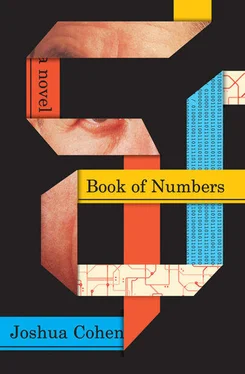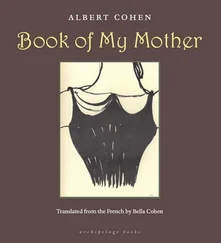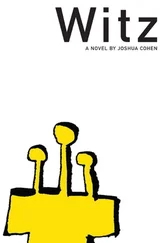[That’s why you went, to count the grains?]
We are going to barf. Pass the bowl.
[Wait, which?]
Pass.
://
[So you can’t tell me what made you drop it all and go monastic? And you won’t tell me what’s up with your health, the vomiting, the Doc Huxtable injectables?]
Balk not.
[Thor Balk again — what does he have to do with you finding religion? Or with the Master Classman?]
What the windbroken pineneedle has to do with the earthworm halved by a hoe. What the dragon howling in the wasted cedar has to do with the grains that fill a kalpa. Nothing. Gibber. The Master Classman was full of that on our arrival. He was very proud of the nature too, but that was fair, we had not expected the nature. We will try for local scenics. It was a monastery. A kakuchi. Pagodas with tiers all stacked, pagoda atop pagoda atop pagoda. Mountains we were told not to wonder which. Waters we were told not to wonder whether the bay or sea or ocean. The nearest neighbors were just jungle and beach. Closer to the beach was a decommissioned nuclearplant. For two months or so we went unrecognized. For 10 weeks we donned a diaper robe to toddle around behind the diaper robes and bibs of vivider colors. Sandals, timekeepers. Clickclack as like keys. The Master Classman was in and out, being driven to and from the airport in Komatsu. Approx two hours away, though not in sandals.
We were allotted our own eight mat hut. It was weatherized and had electric. We took a vow of silence, which was pointless, we took a vow of celibacy, pointless. We were never very capable at being a novice. It required a backengineer, a reversal. This might have bothered the Master Classman, but he was off pursuing abandonment.
Neglect the monk who seeks approval, true approval is neglect. Just a basic Western psych thing, not a koan.
All the monks who supervised our zazen and cooked and served and cleaned up from our meals lived two to each four mat cell, two cells in each hut. They had no electricity, no doubleglazed windows or vents, certainly no private tile bathrooms. They worked, not prepping for rice season or raising livestock, or making indigenous handicrafts, lacquerwork, halite pottery, but readying the guest facilities surrounding ours, doing repairs, vacuuming. We would sit for zazen in the zendo, and then the jikijitsu, who supervised our training, would bash the gong with the butt of his drill and go away to fix sinks and toilets and outlets.
The snows melted, the river thawed and flooded. The grounds were muddy, and even the monster trucks stuck.
Execs showed, from Vitol, Glencore, Trafigura, Saudi Aramco, Gazprom, just in time for the sakura. They were unavoidable, they were chatty, quadlingually chatty. The Master Classman took over zazen, two sesshin a day. He taught “greedy breathing.” He taught a technique called “median digit lust mudra.” But we would skip one or both or the sesshin, to kinhin along the river to the top of a hill and just sit there lotused and yet even there one of the newbies panting and thornpricked and searching for phone reception would inevitably solicit up to us as like we were the shike, asking us if we were going to Burning Man, or Davos, asking us how this experience comptrasted with Burning Man, or Davos, wondering if we would recommend a regression ashram or matha or yeshiva, seeking advice on a pesky archival digitalization issue, seeking advice on synching emails across multiple devices. They would request our presence on philanthropy boards dedicated to eradicating autism. They would make confessions about having autistic children, estranged wives, about how they had come out here to forge closer relationships to family they had left back home, or to recover from mysterious diseases, affluenza. They were men, and under the direction of the Master Classman they did manly bonding things to also get closer to one another, carrying bronze keman and umpan and even gravemarkers extreme distances, samurai fights with rubber katana, sumo fights in rubber fatsuits, waterfall trustfalls. At night girls tramped in full geisha regalia from kimonos to whiteface would be jeeped in from Suzu and Wajima, and we would be awake and out early enough in the morning on kinhin to catch them leaving, and half of them were boys. We refused the ones that came to us, and then an oshō, a priest, showed up at our screen with one or two and an emoticon frown insisting we were getting him in trouble by refusing. We let them stay, the boy and girl, and so as like not to get them fired we performed sexually, but incompletely. So much for our celibacy. So much for our silence.
The oshō kept visiting, having taken notice of our conflict. Anything we say now is flattery, but he recognized us for pure, for attending-intending-to-pure. He took us under his instruction, explaining the writings, the Shōbōgenzō of Dōgen, and even the sutras by which Damo had explained India to Asia, the Prajnaparamita, the Avatamsaka, the Lankavatara. He explicated the Sanskrit, which he could only partially read, but in this language, which he could only partially speak. A child of his had suffered worse than we had and the writings had spared him, had spared the oshō. He got that we were not here for recharging, or hermitage pampering. He confided in us, his ricecloth-wiping-mirror-retaining-reflection. Our essence was communicated, he said, not just by our sexual tact, but by the fact that though we experienced shame we never stopped anyone from their duties, from laundering our koromo, from beating our mats of dust. We understood. Tipping would only insult.
The oshō, who had served at this or another kakuchi before the loss of his child had him joining the Master Classman, snuck to our cell for tutorials. We sat, no zafu, no zabuton, sat smack in our center and zoned. It was as like programming, but deprogramming. Our heads were monitors, our arms extended to hands extended to fingers, our legs and feet and toes were power. If any code inputted on our upper display, the middle converted it to output, which the lower expelled. The ultimate result was not clarity, kensho, or revelation, satori, but just the flinchless acceptance of a thwack, open palm, back of palm, rod of cypress.
The Master Classman disapproved, or so we thought because he sent an unsui to collect us, and though we were not supposed to think or refrain from thinking, this was what we thought, let it pass. He mentioned nothing about our informal sesshin, however.
He just reminded us of the schedule for the impending tech retreat. The Valley visiting the valley.
Then he handed us a parcel. Our luck has not been strong with parcels.
It was an SFO dutyfree plasticbag containing a Canada Post box stuck with customs stickers and addressed to Kor at the Tetplex, which contained a permit to transfer human cremains from the ministère de la Santé et des Services sociaux du Québec, taped around a canister containing Moe, or what was left of him.
[Fuck — but this was legit?]
Every field for name in the documentation had been filled that way, just Moe.
[Are ashes even matchable for DNA?]
The lid was sealed. Glued.
[Kor was using Classman to make his peace with you or what?]
We shook it. There were contents.
[Or did Classman get this together on his own just to fuck with you?]
He who insists on having the end before the beginning. Vagary might be requisite to life.
://
[You’re hanging around a monk monastery in rural Japan with your burnt friend in a thermos?]
Читать дальше












